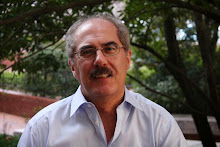Mandalay, Myanmar,
July 24, 2015
Si Thu, the excellent taxi driver from yesterday, came to
collect me after breakfast. He took me to a woodcarving and silk-embroidery
shop and indeed the wares displayed - wooden figures and tables/chairs and
various table cloths etc - were of very high quality, as far as I could judge.
Not sure, if he wanted me just to look or also buy something to get a commission.
He certainly wasn't pushy at all.
Then to the wooden bridge by the river, constructed from 1849 to 1851 to connect a village on the other river bank. The very
solid wooden bridge is 1.2 km long and while often spanning dry land, today due to the
rainy season there was water everywhere. All the rice and potato and tomato
fields had been flooded. In fact, there were a number of fishermen in their
romantic looking fisherboats trying to catch fish.
A famous monastery, one of the largest, if not the largest,
in Myanmar is nearby, just a few minutes by car. It is host to over 1000 Buddhist monks,
most wearing their dark red robes which tells you that they have passed the
examination to qualify as fully fledged monk. But there were also plenty of much
younger monks, the beginners pre-exam so to speak, in their white or beige
robes. Most of them were still kids I would say, some probably as young as 8 or
10.
All of them, all one-thousand, lined up
in two very long lines - one for the pre-exam kids, one lines for the proper
monks - slowly proceeded with
their food dish in hand past a number of huge containers. Some kitchen monks
then put plenty of rice, vegetables and meat in the containers. The monks
then continued to a huge convered but otherwsie open room where they sat down
to eat their lunch. In fact this is the main meal of their day. Monks don't eat
dinner, only water, juice and coffee for the rest of the day. And their
breakfast is at the unholy time of 4 to 5am, before their fest session of
mediation. A monk I met yesterday at a Pagoda expliained this to me.
Thus, most monks qre quite hungry in the
afternoon and evening but have to endure it. They are not allowed to eat anything else after lunch as otherwise the
mind gets distracted from meditation and unholy, perhaps even sexual, thoughts
enter their mind. And control of your own mind, the monk told me, is very
important and needs to be maintained. I wonder if all monks can stick to this
very strict rule. When you look at some of the very young monks - teenagers and
young men in their 20s - one wonders. But perhaps I'm too cynical here.
By this stage it had become afternoon and off I went to the
airport to catch a flight back to Bangkok.
I was a little sad to leave Myramar after only a relatively brief
stay. It's a fascinating country. People
are extremely nice and friendly and if language permits also very talkative. However, they hardly talk about politics and social and economic conditions in their country
- the latter to some extent, but outright politics they don't mention unless
prompted. And also then they don't seem to be much interested (and I don't
think it's fear or apprehension to talk about it - it seems to be largely
disinterest and preoccupation with their lives and sheer survival.) It's a tough country to live in if you just
happen to be an ordinary 'citizen' rather than part of the elite of the very
few rich people here (and usually the latter goes hand in hand).
It also is a very nice and pleasant country and in some
other way, if you have a little bit of money, it's easy to live here.
Unfortunately most people here don't have 'a little bit of money' and need to
make a living the hard way.
Education is a way out but there are no governmental university grants.
If you can't afford to go to high school or university, that's about it. Merit
and brain power alone don't seem to matter much.
It is clear that too much money, way too much money, is
either siphoned off by the powers there are (the military regime), despite all
liberation and modernization attempts, or spend on useless things, like a
military which has one million soldiers under arms. Also their disastrous religious policy
towards the Muslims in the North for example, based on clear discrimination and racism, is wasting a lot of energy and money. A proper social and economic strategy for the
country could make things much better. Things are improving a little though, largely thanks to increased tourism and foreign investments in the last few
years, but there is plenty still to do. Let's hope the forthcoming election in
November 2015 will be the beginning of a more intensive push for positive
change. And of course the presidential
hopeful Aung San Suu Kyi is still waiting in the wings and tremendously popular
but still constitutionally barred from standing for the Presidency. The hope of the country still rests on
her. Perhaps she will get her chance in
the not too far future.

No comments:
Post a Comment